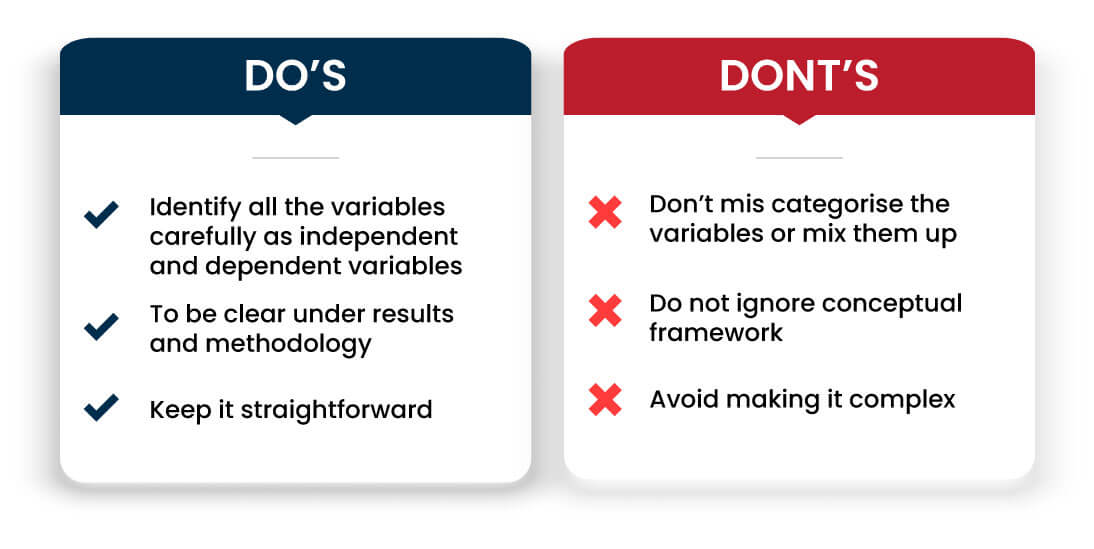Types of Variables
What are Variables?
A variable in research generally refers to a thing, place or phenomena that the researcher is trying to measure in some way. In other words, variables are any characteristics that can take a form in a different manner depending on the phenomena of research under a specific area. However, there are other kinds of variables as well such as; Quantitative Variables, Qualitative Variables and Confounding Variables.
How many Types of Variables
In context of research methodology, there are six basic kinds of variables such as; dependent, independent, intervening, moderator, extraneous and controlled. The variables are formed based on research questions embedded in the study.
Independent Variables
The independent variables are known as the value that impacts the value of another variable is called independent variables. These variables are not impacted by the change in the value of any other variable, yet it affects the value of another pertaining variable. In addition, the impact of independent variable relies upon another variable that is studied or measured at the time of conducting of research. In other words, independent variables are the input variables that cause a specific result. Moreover, the independent variable tends to be a stimulus that impacts any response or a factor that can be changed ( for instance; in an experiment and/or other situations) to impact an outcome. However, it is important to consider that no variable is automatically proportioned to be independent or dependent in a research study. In an attempt to ensure which variables under a research study will be designated as independent or dependent, the main clarification is necessary. For instance, in a research carried out based on a topic such as Quality of instruction and academic performance of students in Southern Nigeria, here the independent variable is “Quality of instruction”, while the dependent variable is “Academic performance of students in universities in Southern Nigeria”.
Dependent Variables
The dependent variable is known as the value of which can be modified because of the change in the value of another variable. The dependent variable is known to be the outcome variable that is caused in part or total by the antecedent or input variable. In simple words, such kind of characteristic is associated with being named as a dependent variable under which dissimilar values can be gathered when there is change under independent variables. In addition, the dependent variable is that variable that is measured and/or tested within a study. For instance, in a research that is placed at how tutoring influences test scores, here the dependent variable will be several participants, test scores since that is which is going to be measured. Furthermore, there are some ways in which an independent variable is determined and its feature are stability and complexity.
Intervening Variables
The intervening variables tend to act like a link between the independent and dependent variables and they account for a causal relationship pertaining among them. In addition, an intervening relationship may not be directly controlled or measured, it has a strong and direct impact upon the result of the research. Moreover, an intervening relationship is also called a mediating variable which explains the relationship held in between dependent variables and independent variables. For instance, a study that focuses upon the association between staff productivity and management practices may have an intervening variable such as job satisfaction. As it can be argued that good management practices may lead to employee’s job satisfaction that may lead to having an impact on job productivity.
Moderating Variables
These variables are such variables that tend to have a conditional impact that is strong enough to change the original relationship held between an independent variable and a dependent variable. As the name of this variable implies it tends to moderate the strength of the association or strength of the relationship situated in between independent and dependent variables. In addition, it impacts the strength or direct relationship held among the dependent and independent variables. For instance, research is carried on for the influence of quality of instructions upon academic performance of the students, this research may have a moderating variable such as interest of students.
Control Variables
These variables in research are such that they are held constant in a study. These variables assist to establish a correlation and/or causal relationship among variables by improvising internal validity.
Extraneous Variables
This variable in research is either excluded or assumed from the investigation of research, but it has to be managed due to it interfering with the association placed upon dependent and independent variables. However, it has to be considered that extraneous variables are placed in practicable research. In addition, extraneous variables are such variables that could impact the research outcomes, still, they have not been appropriately considered in the research.
Quantitative Variables
The quantitative variables in the research study are those variables in which data is represented in form of age, height or weight. These variables are numerical, as the name suggests quantity. These quantitative variables can be dependent and independent.
Qualitative Variables
Quantitative variables are variables that are not measured. These variables do not have the value in form of measuring and/or counting form.
Confounding Variables
These variables in the research are the extra variables that may not be considered by the author of the study when conducting research.
Do’s and Don’t for Variables

Check list for Types of Variables
The check list has been carried out to draw out a check list mentioned below:
- The variables shall be determined clearly depending upon the type of research that is qualitative and quantitative in nature.
- The variables comprises of all of the elements that are related to topic or research matter.
- The selection of variables is based upon the elements or factors identified in the literature review.
- The different types of variables in form of (independent, dependent, mediating, compound etc) are decided when assessing the research carefully.

 Whatsapp
Whatsapp Contact
Contact Call
Call Live Chat
Live Chat